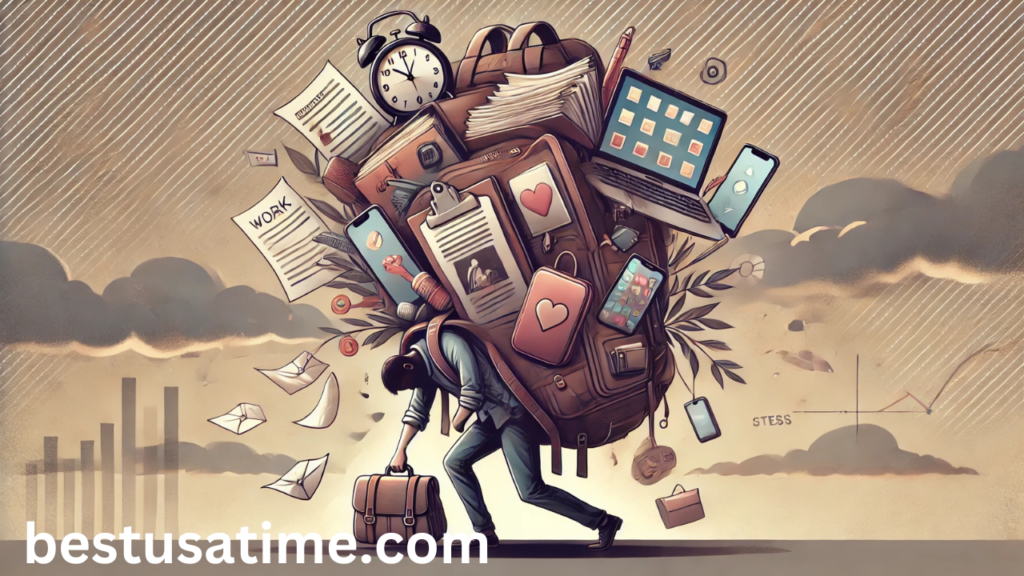like an overstuffed backpack nyt How Carrying Too Much Impacts Your Life

In today’s fast-paced world, it’s easy to feel like you’re carrying an overstuffed backpack. Just like the metaphor in The New York Times highlights, like an overstuffed backpack nyt many of us are burdened by obligations, stress, and constant distractions. These mental, emotional, and physical “backpacks” can often lead to feelings of exhaustion, overwhelm, and even burnout. However, by unpacking these burdens, both figuratively and literally, we can reclaim balance, well-being, and peace of mind. In this article, we will explore the origins of the overstuffed backpack metaphor, its impact on our lives, and strategies to lighten the load and live a more fulfilling existence.
The Origins and Meaning of the Overstuffed Backpack Metaphor
The overstuffed backpack metaphor was popularized in The New York Times as a way of describing the weight many people carry in their daily lives. It’s more than just a physical burden; it represents the accumulated stress from various aspects of modern existence—work pressures, family obligations, social expectations, and the constant noise of digital distractions. The metaphor likens the emotional and mental weight we carry to the heaviness of a backpack stuffed with too many items.
This symbolism speaks to our tendency to overcommit and take on more than we can handle. Just like overloading a backpack can cause physical strain and discomfort, carrying too many responsibilities and expectations can lead to mental and emotional distress. The overstuffed backpack highlights the internal chaos and the overwhelming sensation of having too much on one’s plate. In our current society, this metaphor has become increasingly relevant as many people face the challenge of managing a heavy workload, juggling family life, and navigating the constant demands of technology.
In many cases, the overstuffed backpack is the result of a societal mindset that values busyness over balance. Being constantly occupied is often seen as a sign of success or productivity. However, this mindset can be detrimental to our mental health and overall well-being, leading us to fill our metaphorical backpacks with unnecessary stressors. The concept urges us to examine what we’re carrying, and more importantly, what we can let go of to lead a healthier, more balanced life.
The Impact of Carrying an Overstuffed Backpack

The consequences of carrying an overstuffed backpack can be far-reaching, affecting our physical, mental, and emotional health. First, let’s explore the physical impact of overburdening ourselves. Just as carrying a physically heavy backpack can cause back pain, shoulder strain, and posture issues, the emotional weight of our responsibilities can manifest in physical symptoms. Chronic stress can lead to muscle tension, headaches, fatigue, and even digestive problems. When we constantly push ourselves beyond our limits, our bodies begin to send signals that we need to slow down and lighten the load.
Mentally and emotionally, the weight of an overstuffed backpack can lead to anxiety, stress, and burnout. Multitasking, trying to meet deadlines, and managing multiple projects simultaneously can be mentally exhausting. The pressure to constantly perform and be productive often takes a toll on our cognitive abilities, making it harder to concentrate, make decisions, or engage in creative thinking. Over time, this constant mental overload can lead to burnout, a state of physical, emotional, and mental exhaustion caused by excessive and prolonged stress. Symptoms of burnout include feelings of irritability, emotional numbness, and a sense of detachment from personal and professional responsibilities.
Furthermore, the overstuffed backpack effect has cultural implications. In a world where success is often equated with busyness, the glorification of being constantly on the go has created an environment in which taking a break or slowing down is seen as laziness. This mindset has contributed to a cycle of overwork and stress, where people continue to pile more responsibilities onto their already heavy figurative backpacks. The result is a society that values productivity over well-being, leading to a culture of stress, exhaustion, and dissatisfaction.
Unpacking the Backpack: Strategies for Relief
Fortunately, there are several strategies we can use to lighten the load and unpack our metaphorical backpacks. The first step is to declutter our commitments. In a world where saying yes to every opportunity is often seen as the right approach, learning to say no is crucial for maintaining balance. This doesn’t mean abandoning responsibilities or avoiding challenges; it means being selective about what we take on and focusing on what truly matters. By setting clear priorities and creating boundaries, we can ensure that we are only carrying what aligns with our values and goals.
Another effective strategy for lightening the load is practicing mindfulness and self-care. Mindfulness allows us to stay present and manage stress more effectively. It involves paying attention to our thoughts, feelings, and physical sensations without judgment, helping us to become more aware of when our backpack is becoming too heavy. Mindfulness techniques such as deep breathing, meditation, and journaling can help reduce stress and restore a sense of calm. Additionally, taking regular breaks, engaging in physical exercise, and dedicating time to hobbies or leisure activities can all contribute to a healthier mental state.
Simplifying our environment, both physically and digitally, is another way to reduce the weight of our metaphorical backpack. Decluttering our homes and workspaces can create a sense of order and clarity, making it easier to focus and stay organized. Similarly, minimizing digital distractions by limiting time spent on social media, emails, and notifications can help reduce the mental load caused by constant information bombardment. A minimalist approach, which focuses on owning less and prioritizing quality over quantity, can also encourage a more intentional and peaceful lifestyle.
Finally, cultivating a support system is essential for lightening the load. No one should have to carry their burdens alone. Reaching out to friends, family, or colleagues for support can make a significant difference in managing stress. Sharing responsibilities, seeking advice, or simply talking about challenges can provide much-needed relief. Building a strong support system not only helps with practical tasks but also offers emotional support during difficult times.
Conclusion
The overstuffed backpack metaphor serves as a powerful reminder of the mental, emotional, and physical burdens we carry in our lives. By recognizing the impact of these burdens, we can take steps to lighten the load and create more balance in our daily routines. Whether it’s decluttering our commitments, practicing mindfulness, simplifying our environment, or seeking support from others, there are numerous ways to reduce the weight of our metaphorical backpacks. Ultimately, living a fulfilling and peaceful life requires us to be intentional about what we carry and to recognize when it’s time to unpack.
FAQs
Q: What is the “overstuffed backpack” metaphor?
A: It’s a symbolic representation of the burdens we carry in life, from stress and obligations to societal expectations.
Q: How can I tell if my “backpack” is overstuffed?
A: Signs include feeling overwhelmed, constantly fatigued, or unable to focus. If you’re juggling too many commitments and feeling drained, your metaphorical backpack may be overstuffed.
Q: What are some quick ways to lighten my load?
A: Start by identifying your priorities, saying no to unnecessary commitments, and practicing mindfulness to reduce stress.
Q: Is the concept of the overstuffed backpack only about mental burdens?
A: No, it also applies to physical and emotional stressors, as well as societal pressures. Carrying too many tasks, responsibilities, or even possessions can contribute to an overloaded feeling.
Q: How does minimalism relate to the metaphor?
A: Minimalism encourages removing excess—whether it’s physical belongings, obligations, or distractions—to lead a simpler, more intentional life. By minimizing unnecessary items and commitments, we reduce the weight we carry.
You May Also Read: https://bestusatime.com/isotonix-lawsuit/



